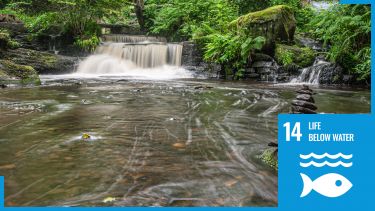SDG14: Life Below Water
We’re researching ways to protect and enhance our oceans and rivers for a sustainable future.

Key facts for how we are achieving SDG14
- Partnerships with local and regional organisations to help restore Sheffield's five rivers
- The Groundwater Protection and Restoration research group work on reducing and mitigating against water pollution and contamination
- Researchers from across the University are working together on a £1million project to reduce global plastic waste from medical products, food and fast-moving consumer good
Research
Sheffield Salmon
In the Salmon of Steel project, researchers at the University of Sheffield are collaborating with local rivers trusts, water companies and the Environment Agency to map out the return of salmon to South Yorkshire’s rivers. Salmon and other migratory fish were once common in the River Don and other waterways around Sheffield, however the Industrial Revolution reduced water quality and led to the construction of weirs that stop fish swimming upstream to their natural spawning grounds in the Pennines. While the Environment Agency and local river trusts work to improve water quality and adapt weirs so fish can move upstream, Sheffield researchers use non-invasive environmental DNA monitoring techniques to monitor the positive impacts on fish migration and biodiversity, and identify any areas for improvement.
Peak District Otters
Researchers from the Department of Animal and Plant Science are working in collaboration with local groups, including the Don Network, UK Wild Otter Trust and Sheffield and Rotherham Wildlife Trust, to study otters in the Peak District. As well as capturing the first video footage of adult and baby otters in the Peak District back in 2018, the project uses DNA analysis to discover more details about Sheffield’s local otters and how they participate in the ecosystem. Investigation of what local otters are eating, including how their diet impacts endangered crayfish species and their invasive predators, is also part of the study.
Ecosystem Tradeoffs
Research in collaboration with the University of Tasmania is investigating how we can optimise feeds to support ecosystem-based aquaculture. Experimental and field data are combined with novel modelling techniques to create ways to assess the different ecological, social and economic consequences of using different types and quantities of feed for commercial fisheries in a range of climate scenarios.
Cleaning Up Rivers
PhD researchers in the Department of Chemical and Biological Engineering are working on a solution to a major problem faced by water ecosystems – dyes in the water. It’s estimated that the textile industry, which often releases dye into rivers during production processes, is responsible for 20% of water pollution globally. Sheffield researchers are working on using nanomaterials that mimic sand to clean dye from rivers. The nanomaterials will either act as sponges that soak up the dye, or transport enzymes to break it down. CBE researchers are also working on making sure this technology is simple and easy to scale up, so that it can be applied anywhere it’s needed.
The Don Catchment
Sheffield has a particularly close affinity with open water, with five rivers winding their way through the city. Neglected and abused for much of the last two centuries, Sheffield's rivers are now the focus of numerous research and development projects to bring them back to life.
The University of Sheffield is uniquely placed at the heart of the Don Catchment. Our students and researchers use the Catchment to help study areas including ecology and conservation , pollution, flooding and the socio-economic impact of rivers
Campus
Cleaning up UK beaches
The introduction of the 30p levy on disposable cups sold on campus by the university is an incentive for customers to bring their own reusable coffee cup. The university will donate the money generated from the levy to the Surfers Against Sewage charity, which helps to clean up the UK’s oceans and beaches.
Education
Undergraduate Courses
Undergraduate students studying Ecology and Conservation Biology at the University of Sheffield have the opportunity to learn about conservation principles, ecosystems and sustainable resource management for land and water ecosystems. Students also have the opportunity to complete a field course in Marine Ecology or Arctic Ecosystems, and to tailor their personal research projects towards water ecosystems.
